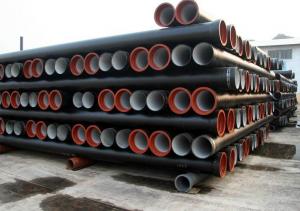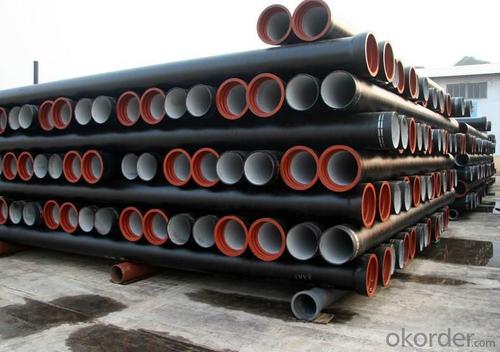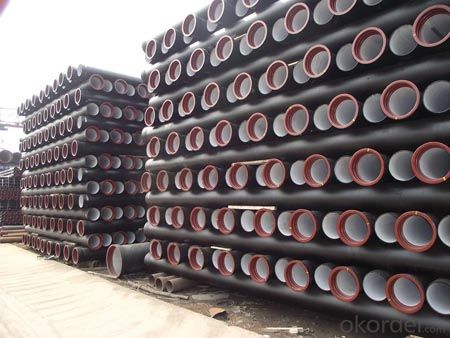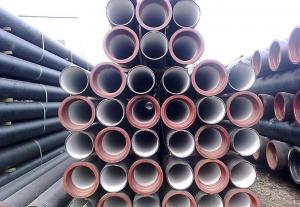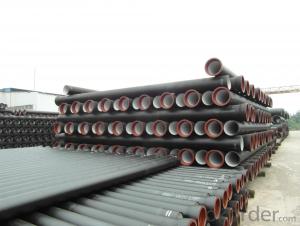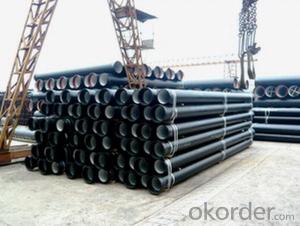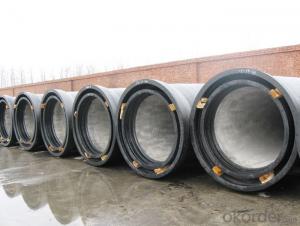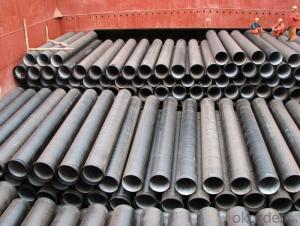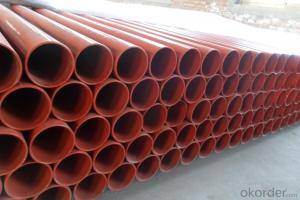Ductile Iron Pipe Class K7/K8/K9 ISO2531
- Loading Port:
- China main port
- Payment Terms:
- TT or LC
- Min Order Qty:
- 1000 m
- Supply Capability:
- 500000 m/month
OKorder Service Pledge
OKorder Financial Service
You Might Also Like
1. Ductile Iron Pipe Description :
It has high strength & hardnes as steel and better corrosin resistance than steerl and grey iron, I ductile iron pipe is the ideal substute for gray cast iron pipe and common steel pipe. In addition, our DI pipes are produced with good straightness, identical wall thickness, high dimension accuracy, smooth surface finished, remarkable mechanical properties and firmly sticking internal & external coating layer as well. Flexible Push-in joint and rubber gasket are used for more convenient installation of pipelines.
2. Ductile Iron Pipe Main Features:
- For potable water supply
- High strength
- Long lifespan
- Good corrosion resistance
- Easy installation
3.Ductile Iron Pipe Images:
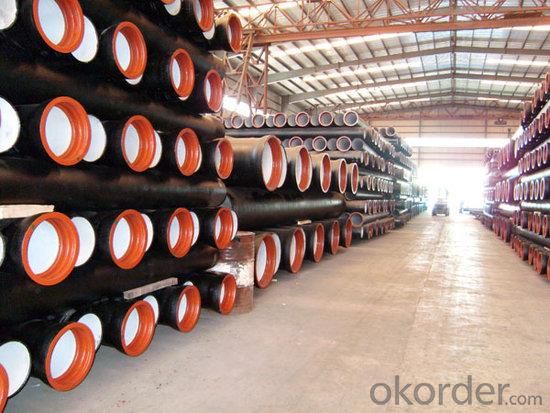
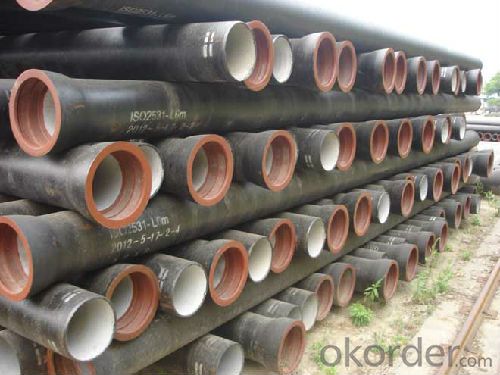
4.Ductile Iron Pipe Specification:
1) The standard of pipe: ISO2531:1998, K9
2) Effective length: 6m
3) Inner cement line: Portland cement line as per ISO4179
4) Zinc coating: at least 130g/m2 as per ISO8179
5) Bitumen painting: at least 70um as per ISO8179
6) With 100% quantity of NBR ring, or SBR ring, or EPDM ring as per ISO4633
7) DN80mm-800mm
5.FAQ:
Here some questions always been asked
1.For Price CIF CFR FOB CPT and so on both ok for us
2.For Delivery we must try us best to send goods to you asap
3.For Package all standard seaworthy package
4.For Payment, T/T L/C which convenience for you will be ok
- Q: Can ductile iron pipes be used for underground steam distribution systems?
- Yes, ductile iron pipes can be used for underground steam distribution systems. Ductile iron has excellent strength, durability, and resistance to high temperatures, making it suitable for carrying steam underground. Additionally, its corrosion resistance properties ensure a longer lifespan and reduced maintenance costs.
- Q: Ductile iron pipes perennial bubbles in the water will rot it
- Ductile iron pipes mainly called centrifugal ductile iron pipe, it has the properties of nature, iron and steel, excellent corrosion resistance, good ductility, good sealing effect, simple installation, mainly for municipal, industrial and mining enterprises, water supply, gas, oil etc..
- Q: What are the typical pressure surge protection measures for ductile iron pipe?
- Some typical pressure surge protection measures for ductile iron pipe include using surge tanks or pressure relief valves, installing air valves or surge anticipation valves, and implementing proper anchoring and support systems to minimize movement and stress on the pipe during pressure surges. Additionally, using flexible joints or expansion joints can help absorb and accommodate sudden changes in pressure.
- Q: What are the typical lengths of ductile iron pipes?
- The typical lengths of ductile iron pipes can vary depending on the specific project requirements and industry standards. However, commonly used lengths for ductile iron pipes range from 18 feet (5.5 meters) to 20 feet (6 meters). These lengths are suitable for various applications such as water distribution, wastewater systems, and industrial pipelines. It is important to note that custom lengths can also be manufactured to meet specific project needs.
- Q: Can ductile iron pipe be used for desalination plants?
- Yes, ductile iron pipe can be used for desalination plants. Ductile iron has excellent corrosion resistance properties, making it suitable for handling the corrosive nature of desalinated water. Additionally, its high strength and durability make it a reliable choice for transporting water in such plants.
- Q: Can ductile iron pipe be used for industrial applications?
- Ductile iron pipe is well-suited for industrial applications due to its strength, durability, and flexibility. It is widely used in various industrial settings like power plants, chemical plants, refineries, and manufacturing plants for transporting water, wastewater, and other fluids. In these environments, where pipes may face exposure to chemicals, high temperatures, or abrasive materials, ductile iron pipe's resistance to corrosion is particularly important. Moreover, its high tensile strength enables it to endure high-pressure applications, making it an excellent choice for industrial use. Overall, ductile iron pipe proves to be a dependable and cost-effective option for a range of industrial applications.
- Q: Are ductile iron pipes recyclable?
- Indeed, it is true that ductile iron pipes possess recyclability. Ductile iron, which belongs to the cast iron family, showcases exceptional sturdiness and endurance, rendering it an ideal selection for a wide array of applications, encompassing water and sewage systems. Once these pipes surpass their lifespan, they can undergo recycling and repurposing. The recycling procedure involves the fusion of the ductile iron pipes, employing the molten metal to generate fresh pipes or alternative iron-based commodities. By recycling ductile iron pipes, not only do we contribute to the conservation of natural resources, but we also curtail the volume of waste that inundates landfills. Hence, ductile iron pipes are perceived as a sustainable and eco-friendly alternative for piping systems.
- Q: What is the expected joint performance of ductile iron pipes?
- Ductile iron pipes are widely recognized for their outstanding joint performance. They possess exceptional durability and strength, making them suitable for a wide range of applications, including water distribution, sewer systems, and industrial pipelines. One crucial aspect of joint performance in ductile iron pipes is their ability to withstand external loads and pressure. To ensure minimal leakage and long-term structural integrity, the joints in these pipes are designed to create a tight and secure connection. This is accomplished through the utilization of various joint types, such as push-on joints, mechanical joints, and restrained joints. Push-on joints are commonly employed in ductile iron pipes due to their ease of installation. They do not require any specialized tools or equipment. These joints rely on a rubber gasket, which guarantees a watertight seal and prevents leakage. On the other hand, mechanical joints involve the use of mechanical devices, such as bolts and nuts, to establish a rigid connection between the pipes. This type of joint provides additional strength and resistance against external forces. Ductile iron pipes have undergone extensive testing to ensure their performance meets or exceeds industry standards for pressure and bending strength. They exhibit high resistance to corrosion, resulting in a longer service life. Additionally, they are less susceptible to damage caused by ground movements or vibrations. These properties contribute to the overall joint performance of ductile iron pipes, ensuring reliable and efficient operation in various infrastructure systems. When properly installed and maintained, ductile iron pipes display remarkable joint performance. They provide a reliable and durable solution for numerous applications within the water and wastewater industry.
- Q: Can ductile iron pipes be used in tunneling or microtunneling projects?
- Tunneling or microtunneling projects can utilize ductile iron pipes. These pipes possess strength, durability, and flexibility, making them appropriate for underground applications. They can endure the external pressure from the surrounding soil or rock during tunneling, guaranteeing the project's integrity and safety. Furthermore, ductile iron pipes exhibit exceptional corrosion resistance, a vital characteristic for tunneling projects where the pipes are exposed to moisture and other corrosive substances. Moreover, their internally smooth surface facilitates the fluid or material flow through the pipes, rendering them an optimal selection for tunneling or microtunneling projects.
- Q: Are ductile iron pipes suitable for use in brewery facilities?
- Yes, ductile iron pipes are suitable for use in brewery facilities. Ductile iron pipes are durable, corrosion-resistant, and can withstand high-pressure applications, making them ideal for transporting water, steam, and other fluids within brewery facilities. Additionally, the smooth interior surface of ductile iron pipes minimizes friction and prevents the build-up of sediments or organic materials, ensuring the purity and quality of the beer being produced.
Send your message to us
Ductile Iron Pipe Class K7/K8/K9 ISO2531
- Loading Port:
- China main port
- Payment Terms:
- TT or LC
- Min Order Qty:
- 1000 m
- Supply Capability:
- 500000 m/month
OKorder Service Pledge
OKorder Financial Service
Similar products
Hot products
Hot Searches
Related keywords
